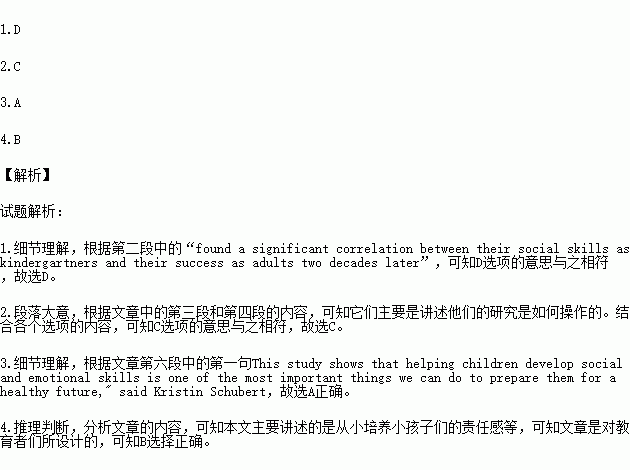题目内容
C
Career success could be predicted as early as kindergarten, according to a 20-year study recently published in the American Journal of Public Health.
Researchers from Pennsylvania State University and Duke University tracked more than 700 children from across the US between kindergarten and age 25 and found a significant correlation between their social skills as kindergartners and their success as adults two decades later.
In 1991, teachers assessed how the kindergartners interacted with each other socially using a range of criteria like whether they cooperate with their peers without prompting(激励), if they're helpful to others, whether they're good at understanding feelings, and if they can solve problems on their own.
Researchers then kept track of whether the students went on to graduate high school on time, get a college degree, and find and keep a full-time job by 25.They also monitored the participants' involvement with crime, drug abuse, public assistance, and mental health issues.
The results showed that socially competent children were far more likely to earn a college degree and have a full-time job by 25 than those with limited social skills.Those with limited social skills also had a higher chance of getting arrested, binge(放纵)drinking, and applying for public housing.
“This study shows that helping children develop social and emotional skills is one of the most important things we can do to prepare them for a healthy future," said Kristin Schubert, program director at the Robert Wood Johnson Foundation, which funded the research, in a release.
“From an early age, these skills can determine whether a child goes to college or prison, and whether they end up employed or addicted." The good news, according to Damon Jones, lead author of the study, is that intervention(干预) at a young age can help improve social and emotional skills.
“This research by itself doesn't prove that higher social competence can lead to better outcomes later on," he said.“But when combined with other research, it is clear that helping children develop these skills increases their chances of success in school, work, and life."
1.What has the 20-year study found?
A.Most kindergartners can solve problems alone.
B.Helpful children understand other's feeling better.
C.Outgoing children cooperate with their peers easily.
D.Social skills play a key role in children's development.
2.Paragraph 3 and 4 are mainly about?
A.when the researchers began their study
B.how long it took to complete the study
C.how the researchers conducted the study
D.what factors were studied by the experts
3.What should parents do to help their children to succeed according to Kristin Schubert?
A.Teach them how to cooperate with others.
B.Teach them some basic living skills.
C.Tell them to keep off alcohol
D.Coach them in their lessons.
4.The text makes very good sense to ____________.
A.teenagers
B.educators
C.doctors
D.general readers

